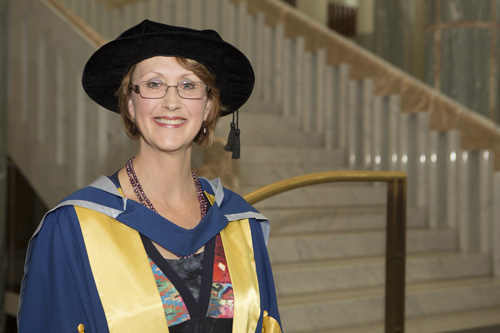Food citizenship feeds passion for PhD
Claudia Doman
14 October 2014: A growing passion for how we relate to food and the decisions we make regarding where we source it led University of Canberra assistant professor in nutrition and dietetics to pursue a PhD on what is known as "food citizenship".

|
PhD recipient Dr Gabrielle O'Kane at graduation. Photo: Michelle McAulay. |
Gabrielle O'Kane received her PhD from the University of Canberra at a graduation ceremony at Parliament House on 9 October.
Dr O'Kane explained that food citizenship is concerned with people's food-related behaviours that help to support a more sustainable food system.
"Food is so ubiquitous in Australia, but I wondered if people really appreciated the food we have available. I wondered if they were in awe of the food available in Australia," she explained.
Dr O'Kane was keen to discover if there were any differences in approaches of those who procured their food from five different places: community gardens, Community Supported Agriculture (CSA), farmers' markets, Belconnen and Fyshwick markets and the main supermarkets in the ACT.
Her research, which focuses on understanding more of people's appreciation of food and what does food mean to them, found that "there is a continuum of engagement in food citizenship from the community gardeners at one end, to the supermarket shoppers at the other".
"I found that those who procured food from local food systems experience a contemporary relational food culture, so the people and places involved in producing their food were important to them as part of their enjoyment of that food."
The mother of three juggled her part-time PhD studies with her teaching and research work as well as her family and physical activity commitments.
"Doing a PhD part-time while working full-time and raising a family was hard work," she said. "I think I managed to juggle it all by making sure I kept up my exercise – I like to swim, ride my bike, go to the gym, but I have also taken up rowing (only this year)."
And on top of that, Dr O'Kane has also been singing with a choir on Wednesday nights. "You have to do these things to maintain a good work/life balance. I also have a husband who works part-time and was able to pick children up when necessary. That made a big difference for managing the family," she said.
The active 56-year-old academic now looks forward to publishing papers from her thesis. "I have already had one paper published based on my literature review, but also have another in the pipeline about pathways to food citizenship."
Her passion for healthy eating, nutrition and the procurement of food spills onto her students. Dr O'Kane, who teaches an average of 150 students each year, said she is working with two of her postgraduate students to investigate cost comparisons of fruit and vegetables from farmers' markets, supermarkets and fresh food markets.
"We want to see how differences in price influence people's choices on where they buy. It may be perception rather than reality that the farmers' markets are dearer," she said.
"I am also interested in whether those who procure food in local food systems have a different diet to those who purchase at the fresh food markets or supermarkets. I am hoping to get an honours student to develop a valid and reliable tool that will enable measurement of differences."
Dr O'Kane said it's all worth it. "Completing a PhD is a major achievement from an intellectual point of view, but it is also a measure of perseverance," she said.
Read more University of Canberra Graduation stories:
High honour for human rights advocate
Paralympian Peter's new passion
Ron recongnised with UC honorary degree
Construction career built on dad's legacy


